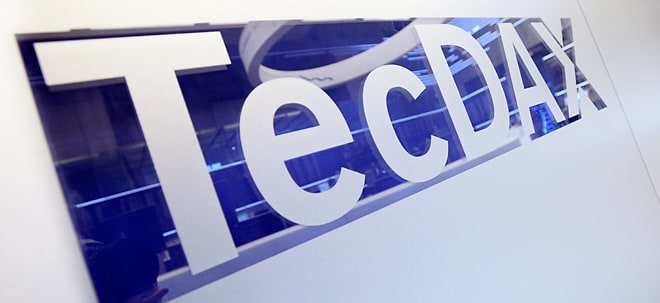A moment in markets - The electric opportunity is broader than Tesla
Werbemitteilung unseres Partners
finanzen.net GmbH ist für die Inhalte dieses Artikels nicht verantwortlich

It is hard for anyone remotely cognizant of the developments in financial markets to not have taken note of the meteoric rise in Tesla’s share price in recent months. The stock’s strong momentum recently has appealed to many investors and gathered a lot of media attention.
Stock market rallies are often accompanied by regrets of having missed the boat and anguish over elevated valuations. Tesla’s surge, however, is symptomatic of a broader trend in markets. The energy transition is accelerating, and the electric vehicles (EVs) theme is at the forefront of this megatrend. Encouragingly for investors, the investment opportunity is not only broader than a handful of high-profile stocks, but also geared for a longer journey. The more upstream links in the battery value chain need to expand to enable the growth in consumer applications such as EVs. The value chain encompasses raw materials and battery manufacturing and sits within a broader ecosystem which includes emerging technology like wireless charging and hydrogen fuel cells and enablers such as recycling and charging infrastructure. A broad exposure to this ecosystem could be an effective way to harness the growth potential in this theme.
Better batteries, that are both cost and energy efficient, will foster the adoption of electric vehicles more widely. According to Wood Mackenzie, battery costs are expected to halve within the next decade and reach a critical adoption threshold of $100/kWh by 2027. Achieving this goal will be crucial given the bans many countries have introduced on the sale of new petrol and diesel cars within the next decade. As this advancement takes place, battery chemistries are also likely to evolve. We are already seeing a divergence in battery chemistries with US and Europe focusing on lithium-ion batteries and China exploring a potentially cheaper lithium-iron phosphate battery.
Research and development will extend beyond battery chemistries into the realm of alternative sources of powering vehicles as well. Within this space, fuel cells are likely to draw more interest. Fuel cells are lighter and smaller in terms of volume compared to batteries. They are also generally deemed to be quicker to refuel compared to charging batteries. These are among the factors why the auto industry is taking a keen interest in fuel cells as another source of electrical power for cars. But a bigger debate currently in the industry revolves around costs and energy efficiency. Batteries are currently much cheaper to operate than fuel cells and, with technology evolving quickly, battery costs are continuing to fall. Batteries are also more efficient when looking at the entire cycle of bringing the fuel from ‘well to tank’ and ‘tank to wheel’, i.e., sourcing the fuel and utilising it to run cars. According to Volkswagen’s recent study with management consultancy Horváth & Partners (2020), batteries deliver an overall energy efficiency of 70-90% during this process while fuel cells deliver 25-35% efficiency. This is because the production of hydrogen for fuel cells, as it stands, is not entirely ‘green’. As further innovation in this space takes place, increasing the energy efficiency of the whole process, and bringing costs down, will be the key challenges for the widespread adoption of fuel cells.
Charging infrastructure will also require significant investment for it to truly become an enabler rather than a constraint of EV technology. Wood Mackenzie forecast half of all passenger car sales to be electric by 2040. Only a well spread charging network can support this proliferation of EVs on roads. But the infrastructure growth is under way already. Shell’s recent acquisition of UK’s largest electric vehicle charging network provider Ubitricity bears testimony to the energy transition with major energy companies investing in the electric power supply chain. Precedence Research forecast the global EV charging station market size to exceed USD 39.2bn by the end of 2027 with a compound annual growth rate of over 40% between 2020 and 2027.
The growth in the electric vehicle theme is therefore not captured by a single stock’s rally over a few weeks or months. Instead, it relates to a structural shift expected to take place over several years, if not decades. The investment opportunity, therefore, is broader and long term.
This material is prepared by WisdomTree and its affiliates and is not intended to be relied upon as a forecast, research or investment advice, and is not a recommendation, offer or solicitation to buy or sell any securities or to adopt any investment strategy. The opinions expressed are as of the date of production and may change as subsequent conditions vary. The information and opinions contained in this material are derived from proprietary and non-proprietary sources. As such, no warranty of accuracy or reliability is given and no responsibility arising in any other way for errors and omissions (including responsibility to any person by reason of negligence) is accepted by WisdomTree, nor any affiliate, nor any of their officers, employees or agents. Reliance upon information in this material is at the sole discretion of the reader. Past performance is not a reliable indicator of future performance.
Mobeen Tahir, Associate Director, Research, WisdomTree
Mobeen is a member of WisdomTree’s research team where he focuses on a wide range of asset classes to offer strategic and tactical insights to our clients on global markets and investment products.
Before joining WisdomTree in December 2018, Mobeen worked at Willis Towers Watson as an investment consultant advising institutional clients as well as their in-house fund business on asset allocation and portfolio construction with his research focus being equity and multi-asset smart beta.
Mobeen has a BSc (Hons) in Accounting and Financial Management from Loughborough University and an MSc in Accounting and Finance from the London School of Economics and Political Science. He is also a CFA Charterholder.
WisdomTree Einblicke


